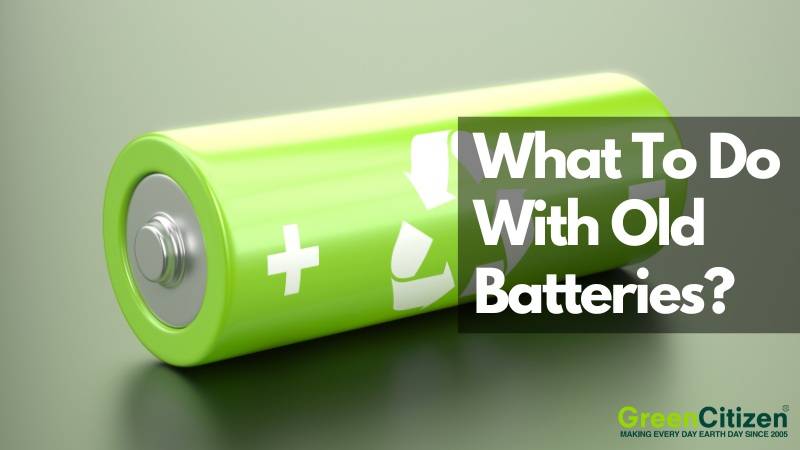Old batteries pile up quickly — from remote controls, toys, phones, and countless other devices. But can you throw them in the trash?
Absolutely not.
Batteries contain hazardous materials like lithium, lead, and cadmium that can leak into soil and water, cause fires, or harm recycling systems if disposed of improperly.
That’s why knowing how to dispose of old batteries safely is critical. Whether you’re handling AA batteries, lithium-ion packs, or car batteries, this guide explains where to recycle batteries, how to store them safely, and why responsible battery disposal protects people and the planet.
Note: GreenCitizen cannot currently accept any loose batteries not installed in electronics due to hazards associated with handling and storage.
Key Takeaway: What To Do with Batteries?
Recycle old batteries according to type. Alkaline batteries can go to hardware stores or Call2Recycle. Button batteries should be taken to electronics stores or hazardous waste centers. Lithium and rechargeable batteries require certified recycling programs. Car and lead-acid batteries must go to auto shops or specialized recycling centers.
How to Dispose of Old Batteries Safely
Not all batteries are the same. Each type—whether it’s a tiny button battery or a bulky car battery—requires proper handling. Improper disposal can lead to leaks, fires, and environmental pollution.
Recycling is always the safest, most responsible choice.
How to Dispose of Alkaline Batteries (AA, AAA, 9V)
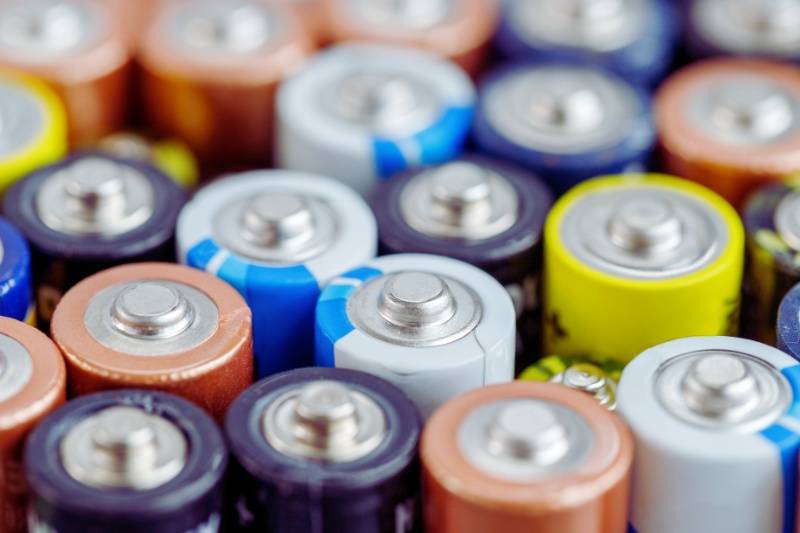
Alkaline batteries are commonly used in flashlights, toys, and TV remotes. Think of them as the most common type of single-use batteries. Thanks to the Mercury-Containing and Rechargeable Battery Management Act of 1996, they no longer contain mercury and are technically safe for landfill disposal.
However, recycling alkaline batteries is a smarter choice. Steel and zinc from these batteries can be recovered and reused. Many hardware stores like Home Depot or Lowe’s offer drop-off programs.
You can also use services like Call2Recycle.
TL;DR: Recycle alkaline batteries at hardware stores like Home Depot or Lowe’s, or through Call2Recycle.
How to Recycle Button Batteries (Watches, Hearing Aids)
Button batteries, like those found in watches or hearing aids, contain toxic materials such as mercury, making them hazardous if thrown in the trash. Although no federal law stops you from throwing it in the garbage, the Environmental Protection Agency (EPA) recommends recycling button batteries.
Recycling is the better option, as the mercury, silver, and zinc inside can be recovered and reused. These batteries are small but dangerous to the environment if not disposed of properly.
Check if your local electronics stores or hazardous waste collection centers take this battery. Programs like Call2Recycle or local recycling events often accept them, ensuring their harmful materials don’t end up polluting the environment.
How To Recycle Lithium Batteries (Single-Use)?
Single-use lithium batteries power devices like cameras and calculators. They’re often confused with lithium-ion batteries but are not the same. Both types are a fire hazard when improperly disposed of.
Never throw lithium batteries in the trash. Instead, recycle through electronics retailers, hazardous waste programs, or Call2Recycle to recover valuable materials like lithium.
How to Safely Dispose of Lithium-Ion Batteries (Phones, Laptops)
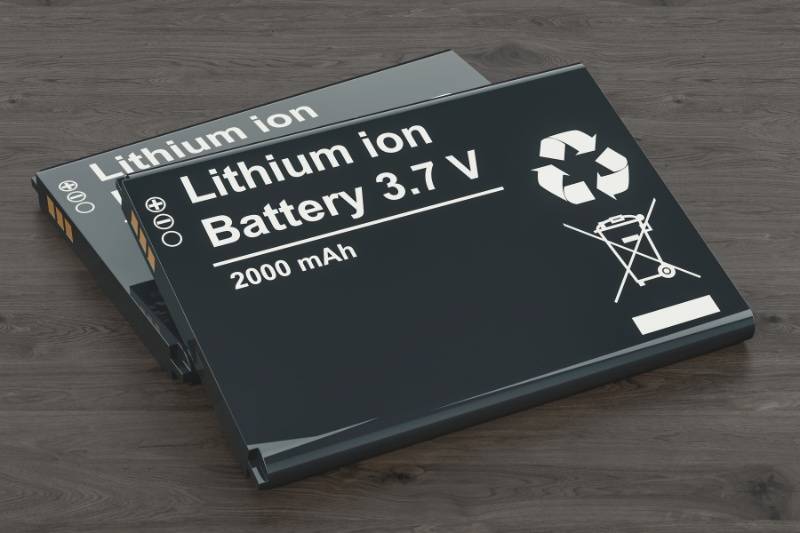
Lithium-ion batteries are everywhere—from phones and laptops to power tools. They pose serious fire risks when damaged or thrown away.
Recycle them through electronics stores, hazardous waste facilities, or recycling programs. Recycling recovers lithium, cobalt, and nickel, supporting both safety and sustainability.
Never throw lithium-ion batteries from phones or laptops in the trash. They’re a fire hazard and contain toxic materials. Recycle them through certified e-waste programs to ensure safe disposal
How to Dispose of NiMH Batteries Properly (Digital Cameras, Power Tools)
Nickel Metal Hydride (NiMH) batteries are common in digital cameras, cordless phones, and tools. While less toxic than older types, they still contain heavy metals.
Recycle these batteries through electronics stores or battery recycling programs to recover nickel and reduce landfill waste.
How to Recycle Nickel-Cadmium (NiCad) Batteries (Older Electronics, Tools)
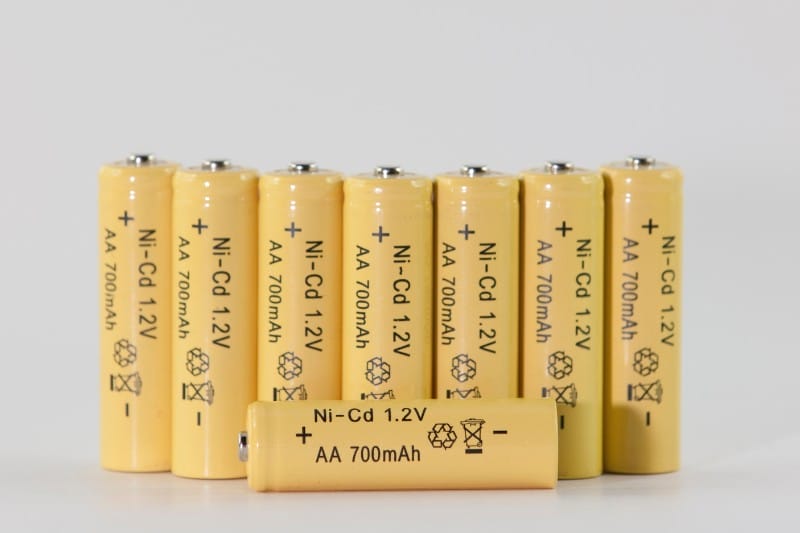
Nickel-Cadmium (NiCad) batteries are highly toxic due to cadmium. Improper disposal contaminates soil and water. These batteries were widely used in cordless tools and emergency lights.
Recycle through hazardous waste centers or electronics stores. Proper recycling recovers materials and prevents environmental harm.
How to Recycle Car and Lead-Acid Batteries (Safely and Responsibly)
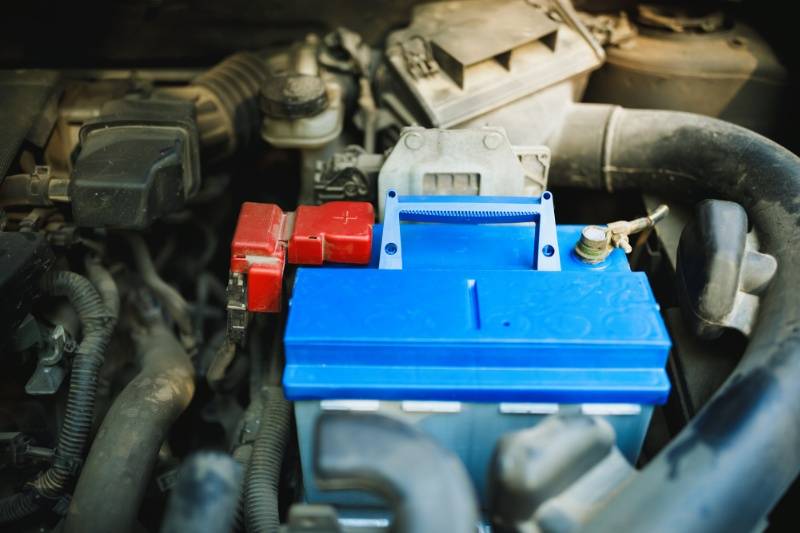
Car batteries—including traditional lead-acid types and modern EV battery packs—contain hazardous materials like lead and sulfuric acid. Improper disposal can cause serious environmental and health risks.
Recycle through auto shops, dealerships, hazardous waste facilities, or certified e-waste recyclers.
Many retailers offer battery recycling when you purchase a new battery. GreenCitizen’s Green Directory can also help you locate responsible recycling programs near you.
How To Prepare Batteries for Recycling
Before you recycle old batteries, follow these simple steps to ensure safe handling and prevent fire risks during storage and transport. Proper preparation helps protect you, recycling workers, and the environment.
- Tape the Terminals: Cover the terminals with clear tape to avoid short circuits for rechargeable and lithium batteries.
- Sort by Type: Separate batteries by type—lithium-ion, alkaline, nickel-metal hydride, etc.—as recycling centers process them differently.
- Use Non-Conductive Containers: Place the batteries in a plastic or non-conductive container to prevent accidental sparks during transportation.
- Check Local Guidelines: Different areas have specific rules for battery recycling, so ensure you follow them.
Key Takeaway: Proper battery preparation helps prevent fire hazards, ensures compliance with recycling laws, and makes recycling more efficient. Whether you’re using a local drop-off or mailing them in, safe preparation protects people and the planet.
Where to Recycle Old Batteries Near You
Find Local Battery Recycling Drop-Off Locations
Finding places to recycle old batteries is easier than ever. Both municipal recycling programs and private facilities offer convenient battery drop-off options. Some centers accept batteries for free, while others may charge a small fee—especially for large quantities or specialty battery types.
One of the simplest ways to locate recycling options is by using GreenCitizen’s Green Directory. Just enter your item (batteries) and your location, and the tool will show certified battery recycling centers near you.
It’s a fast, reliable way to find drop-off sites for everything from alkaline batteries to rechargeable lithium-ion batteries.

Pro Tip: Always call ahead to confirm accepted battery types, hours of operation, and any preparation requirements (like separating batteries or taping terminals). Websites aren’t always updated in real-time, and rules may vary by location.
Mail-In Battery Recycling Programs
For added convenience, consider using mail-in battery recycling services. These programs are ideal if you have mixed batteries, larger quantities, or no nearby drop-off location.
Here’s how most mail-in battery recycling programs work:
- Purchase a certified battery recycling box or container from the provider.
- Fill the box with your used batteries according to the included guidelines.
- Mail it back once full—shipping is typically pre-paid.
Recommended Mail-In Programs:
- Cirba Solutions: A leading name in battery recycling, offering mail-in services for households and businesses.
- Retriev Technologies / Battery Solutions (now part of Cirba): Previously known for Big Green Box, now operating under Cirba’s network.
Before mailing, always verify the packaging requirements with your chosen provider. Proper packing prevents fires and ensures compliance with hazardous material shipping regulations.
What NOT to Do With Old Batteries
When disposing of old batteries, some mistakes can be dangerous for both you and the environment.
- Don’t Throw Them in the Trash: Batteries contain chemicals that can leach into landfills, contaminating the soil and water supply.
- Never Toss Them in Fire or Extreme Heat: This can cause explosions or fires due to the volatile chemicals inside.
- Don’t Recharge Non-Rechargeable Batteries: Trying to recharge a non-rechargeable battery can cause overheating, leaks, or battery failure.
- Don’t Leave Them Loose: Uncovered terminals can short-circuit, leading to sparks or fire.
- Avoid Mixing Different Battery Types: Keep battery types separate to avoid chemical reactions.
TL;DR: Battery recycling protects natural resources, reduces pollution, and prevents fires — making it a critical responsibility for everyone. Small actions lead to big environmental benefits.
Why Should You Bother Recycling Batteries?
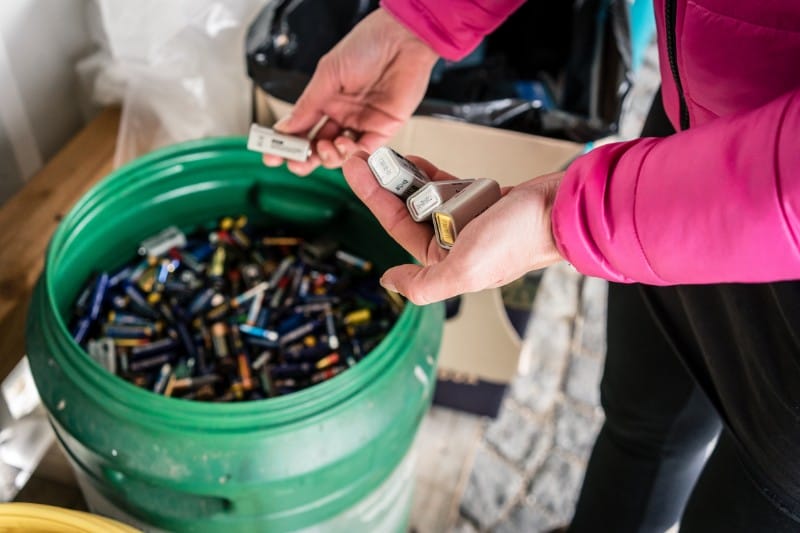
- Prevent Groundwater Contamination: Batteries contain harmful materials like mercury and lead, which can leach into groundwater if left in landfills. This contamination can harm both ecosystems and drinking water supplies.
- Reduce Pollution: Toxic chemicals in improperly disposed batteries can release pollutants into the air, soil, and water, leading to long-term environmental damage. Recycling minimizes these risks.
- Conserve Resources: In 2018 alone, 2.5 million tons of nonferrous metals, including 1.7 million tons of lead from batteries, ended up in landfills. Recycling these materials helps recover valuable metals and reduces the need for mining new ones.
- Minimize Waste: Proper recycling reduces the number of batteries ending up in landfills, easing the burden on waste management systems and preventing dangerous chemical leakage. States like California categorize discarded batteries as hazardous and ban them from being thrown in the trash. They offer myriad recycling resources, from local drop-offs to mail-in services.
- Reduce Fire Hazards: Batteries, especially lithium-ion ones, can spark and cause fires if not disposed of properly. Recycling ensures they’re handled safely, reducing fire risks in landfills and homes.
Recycling batteries benefits both the environment and public safety, making it a critical responsibility for everyone.
Take Action: Recycle Your Old Batteries the Right Way
Proper battery disposal isn’t just about following the rules — it’s about preventing pollution, reducing fire hazards, and conserving valuable resources. Whether you choose a local drop-off center or a mail-in recycling program, every battery recycled is a step toward a safer, cleaner planet.
Use tools like GreenCitizen’s Green Directory to quickly find trusted recycling options near you.
Don’t let your old batteries become tomorrow’s environmental hazard — recycle them today.
